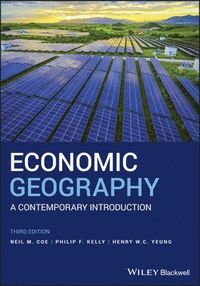
spara 25%
2 säljare
Economic Geography Upplaga 3
A revised and updated edition of the leading introductory text on the geography of economic life, from the local to the global
Economic Geography is an engaging and accessible introduction to the different ways modern economic geographers understand, analyze, and interpret economic processes. This comprehensive text addresses significant questions relevant to contemporary economic life, from the activities of transnational corporations to issues surrounding workplaces and consumption. It encourages readers to explore how spatial patterns, places, networks, and territories shape large-scale economic processes. Accessible, highly-illustrated material presents fresh insights from the field—complemented by relatable, real-world examples that help students understand the social, cultural, and political contexts underpinning global economic processes.
Now in its third edition, this extensively revised and updated textbook retains the features and thematic structure that have proved popular with students and instructors alike, while adding exciting new content. New chapters explore how the global economy and global development are institutionalized and governed, the economic geographies of global climate change, economic practices outside the capitalist mainstream, the role of migrants in labour markets, global production networks, and more.
Introduces economic geography with a thematic approach including major concepts, current debates, and case studiesRevised and updated to enhance international coverage, including three entirely new chapters on international development, alternative economies, and global climate changeSubstantial new content on labour migration, global production networks, and recent intellectual trends such as evolutionary economic geographyHighly illustrated with diagrams and photographs closely integrated into the textPedagogical aids including key case studies, learning objectives, text boxes, chapter essay questions, summaries, and further readingCore geographical concepts – such as place, networks and territory – are closely integrated into all chapters. Economic Geography: A Contemporary Introduction is an invaluable source of up-to-date knowledge for students new to the field, for those requiring a solid foundation, as well as for a broader academic and public readership with interest in this area of study.
Upplaga: 3e upplagan
Utgiven: 2019
ISBN: 9781119389552
Förlag: Wiley-Blackwell
Format: Häftad
Språk: Engelska
Sidor: 576 st
A revised and updated edition of the leading introductory text on the geography of economic life, from the local to the global
Economic Geography is an engaging and accessible introduction to the different ways modern economic geographers understand, analyze, and interpret economic processes. This comprehensive text addresses significant questions relevant to contemporary economic life, from the activities of transnational corporations to issues surrounding workplaces and consumption. It encourages readers to explore how spatial patterns, places, networks, and territories shape large-scale economic processes. Accessible, highly-illustrated material presents fresh insights from the field—complemented by relatable, real-world examples that help students understand the social, cultural, and political contexts underpinning global economic processes.
Now in its third edition, this extensively revised and updated textbook retains the features and thematic structure that have proved popular with students and instructors alike, while adding exciting new content. New chapters explore how the global economy and global development are institutionalized and governed, the economic geographies of global climate change, economic practices outside the capitalist mainstream, the role of migrants in labour markets, global production networks, and more.
Introduces economic geography with a thematic approach including major concepts, current debates, and case studiesRevised and updated to enhance international coverage, including three entirely new chapters on international development, alternative economies, and global climate changeSubstantial new content on labour migration, global production networks, and recent intellectual trends such as evolutionary economic geographyHighly illustrated with diagrams and photographs closely integrated into the textPedagogical aids including key case studies, learning objectives, text boxes, chapter essay questions, summaries, and further readingCore geographical concepts – such as place, networks and territory – are closely integrated into all chapters. Economic Geography: A Contemporary Introduction is an invaluable source of up-to-date knowledge for students new to the field, for those requiring a solid foundation, as well as for a broader academic and public readership with interest in this area of study.
Begagnad bok
395 kr522 krSpara 127 kr (25%) mot nypris
Fri frakt & skickas inom 1-3 vardagar
Köpskydd med Studentapan
Varje köp täcks av Studentapans köpskydd som säkerställer att boken kommer fram, att du får rätt bok och att skicket stämmer överens med beskrivning.



